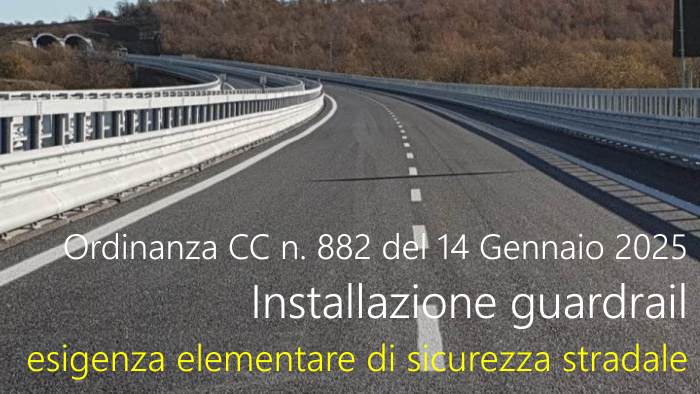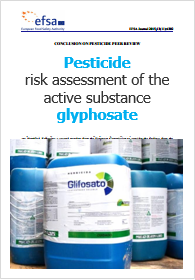Ordinanza CC n. 882 del 14 Gennaio 2025

Ordinanza Corte di Cassazione (Terza Sezione Civile) n. 882 del 14 Gennaio 2025 / Installazione barriera di sicurezza è esigenza elementare di sicurezza stradale.
ID 23295 | 15.01.2025 / Sentenza alle...

The conclusions of the European Food Safety Authority (EFSA), following the peer review of the initial risk assessments carried out by the competent authority of the rapporteur Member State Germany, for the pesticide active substance glyphosate are reported. The context of the peer review was that required by Commission Regulation (EU) No 1141/2010 as amended by Commission Implementing Regulation (EU) No 380/2013.
The conclusions were reached on the basis of the evaluation of the representative uses of glyphosate as a herbicide on emerged annual, perennial and biennial weeds in all crops [crops including but not restricted to root and tuber vegetables, bulb vegetables, stem vegetables, field vegetables (fruiting vegetables, brassica vegetables, leaf vegetables and fresh herbs, legume vegetables), pulses, oil seeds, potatoes, cereals, and sugar- and fodder beet; orchard crops and vine, before planting fruit crops, ornamentals, trees, nursery plants etc.] and foliar spraying for desiccation in cereals and oilseeds (pre-harvest).
The reliable endpoints, concluded as being appropriate for use in regulatory risk assessment and derived from the available studies and literature in the dossier peer reviewed, are presented. Missing information identified as being required by the regulatory framework is listed. Concerns are identified.
Following a second mandate from the European Commission to consider the findings from the International Agency for Research on Cancer (IARC) regarding the potential carcinogenicity of glyphosate or glyphosate-containing plant protection products in the on-going peer review of the active substance, EFSA concluded that glyphosate is unlikely to pose a carcinogenic hazard to humans and the evidence does not support classification with regard to its carcinogenic potential according to Regulation (EC) No 1272/2008.
European Food Safety Authority (EFSA), Parma, Italy

ID 23295 | 15.01.2025 / Sentenza alle...

ID 22341 | 29.07.2024 / In allegato Testo interpello Ambientale
L’art. 27 del decreto-legge n. 77 del 31 maggio 2...
ID 22457 | 22.08.2024
Decreto 8 agosto 2024 Sostituzione dell'allegato VIII del decreto legislativo 8 novembre 2021, n. 199 - Materie prime double ...
Testata editoriale iscritta al n. 22/2024 del registro periodici della cancelleria del Tribunale di Perugia in data 19.11.2024